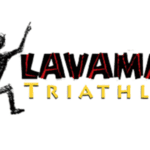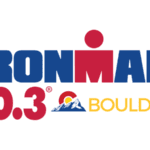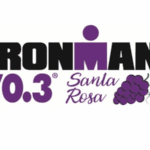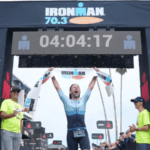An Ironman triathlon is one of the most grueling physical and emotional
sporting events that a person can do.
The training alone can last anywhere from six months to several years.
Hundreds or even thousands of hours are dedicated to pushing yourself to
new limits.
Swimming, biking, and running are just a part of it.
Training for an
Ironman consumes your life.
The way you eat changes.
The way you sleep changes.
The way you think
changes.
If you are going to dedicate so much time to something, you want
to do your best!
You become obsessed with getting faster in the pool.
You become obsessed
with getting every aerodynamic gain possible on the bike.
You push yourself
until you break on your runs.
Then race day comes, and you lay it all out on the line.
Everything you
worked for.
Time to execute.
One thing I experienced first hand a few weeks ago, is nervousness before a
race.
Part of it was because of the unknown of the bike course.
But mainly
it was because I set some difficult performance goals for myself.
I knew I
couldn‚’t control anything but my own race, but doubt and worry still crept
in my head.
As you know from my race report, things didn‚’t go at all how I planned it in my head.
I walked away from
the race feeling broken.
Physically I was fine.
I didn‚’t even have one sore
muscle after the race.
Emotionally and mentally however, I was damaged.
I built up that particular race as my A race.
I wanted to be at peak form.
It was a beautiful race venue, the course was “easy”, and the weather was
going to be perfect.
When all was said and done, all those things were
true.
Technically speaking, I still did get a PR.
But that wasn‚’t enough
for me.
Maybe I wanted that physically broken feeling, where I knew I gave it my
all.
I mean, I did give it my all with what I had that day, but it wasn‚’t
really my all.
As I crossed the finish line, I felt like I settled, even
though there is no chance I could have performed how I originally wanted.
I laid in bed the night of the race, sick to the stomach (literally), and
glad I wasn‚’t still on course.
I woke up not feeling like I accomplished
anything.
I didn‚’t feel like I did an Ironman.
I wasn‚’t proud.
I was
depressed.
I needed some time to process what had happened.
I needed some perspective.
We stayed in Napa a few days to unwind, and while it was wonderful, I still
wasn‚’t as happy as I could have been.
I was mentally and emotionally
drained.
I needed some time off.
I have only taken multiple days off four times in the last four years.
They
came after marathons or my Ironman.
This time, I took almost a full week
off, and when I started back up, it was hard.
I felt slow.
I felt tired.
I felt like I did an Ironman.
It was only at
that moment when I started to realize that win or lose, Ironman triathlons
are an accomplishment.
In the first Ironman I did, I crossed the line and said I didn‚’t want to do
that again.
I was struggling.
I didn‚’t enjoy the second half of the run.
This time, despite everything, I finished the race running a 7 minute/mile
pace.
I beat my previous time, and despite my stomach, I was physically ok.
Why does this matter? Because it showed me that my training did pay off.
The 500 hours of training between races made me a better athlete, so that I
was able to finish faster, and be more physically prepared.
This idea provided me some of the validation I was looking for after the
race.
I was in a better spot than I was the year before.
Perspective.
Another few days went by after my revelation, and slowly I started to add
more recovery rides and swims.
Just getting the blood flowing.
After two weeks, I was finally able to start real workouts, and also ran
for the first time…and boy did it feel good.
Before I knew it I was planning my race schedule for 2020 and 2021, and
even adding a handful of shorter races this year.
I was able to fight
through the depression I was feeling from the race, and get that chip back
on my shoulder.
Mental toughness is a huge part of endurance racing.
It is what gets us
through the hard intervals and long training sessions.
However, we are only
human, and sometimes we aren‚’t as tough as we think.
Or at least that‚’s me.
Luckily for me, I have an amazing support crew, who lifts me up when I do
fall.
I honestly wouldn‚’t be able to complete these races without having
such support from Janell and my family and friends.
Ironman‚’s are not as
individual as they may seem.
Going forward, I will continue to set goals for training and races.
However, after this experience, I know what is actually important to
worry/think about.
I have perspective.






